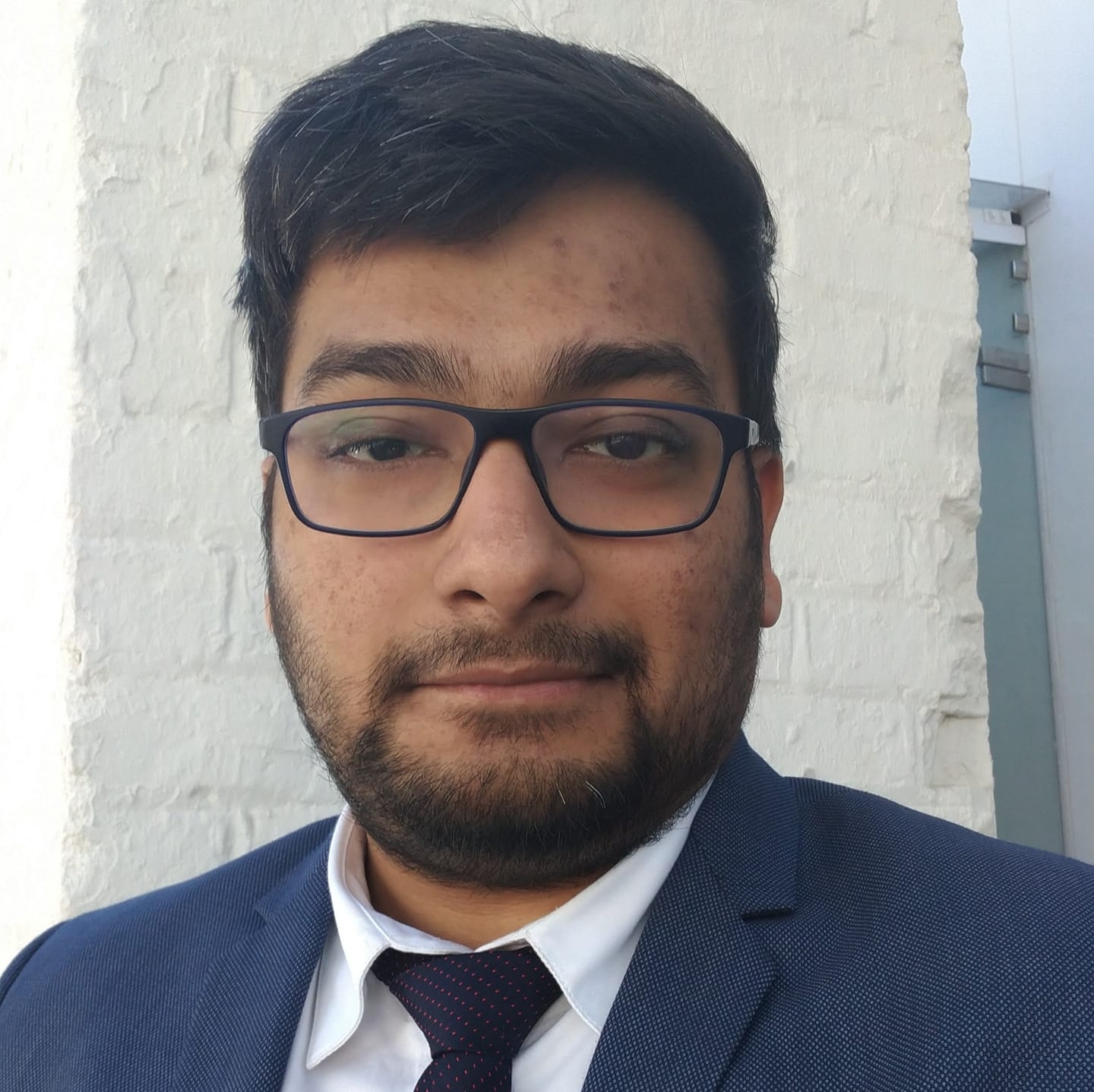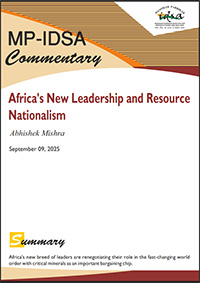Africa’s New Leadership and Resource Nationalism
- September 09, 2025 |
- IDSA Comments
Africa has a central role in regulating metals critical for energy transition technologies, given that it has nearly a third of global mineral reserves. For generations, Africa’s vast potential has failed to translate into prosperity for its people. Instead, it has fuelled resource extraction without empowerment, a global paradox where the richest lands are often home to the poorest populations.
However, times are changing. A new generation of African leaders and entrepreneurs wants to change the narrative related to the growth and development of the African continent. Even though Africa is endowed with abundant natural resources, it is still revenue-deficient. As such, these leaders would like to see Africa evolve into a more resource-smart and innovation-driven continent.
There is a growing realisation that African nations need to mine their minerals and assert their ownership across the entire value chain—from exploration, processing, manufacturing, to global distribution.[1] Given the lack of effective export infrastructure, corruption, and a lack of trained workforce and transparency, capturing the entire value chain may present many challenges.
African Resource Nationalism
From an African perspective, some nuances and demands are increasingly evident. In their engagements with foreign governments/companies, African leaders prioritise adding value to commodities. They are demanding their international partners’ support in promoting local mineral processing in host nations. Increasingly, they review or cancel foreign contracts signed earlier and strike harder bargains with foreign companies wanting to conduct business in African markets.
A recent trend involves reforming mining codes by incorporating obligations to treat and process minerals locally before export, seeking to increase mining royalties, and enforcing stricter environmental and Corporate and Social Responsibility (CSR) compliance. Efforts are being made to align national mining policies with the continental Africa Mining Vision, a flagship programme of the African Union.[2]
Initiatives and moves in this direction started in 2017 when the Tanzanian government reformed its Mining Law by banning the export of unprocessed ores and imposing a one per cent clearing fee on all minerals exported from Tanzania. In 2022, both Nigeria and Zimbabwe banned exports of unprocessed lithium ores. This was followed by Namibia, which in June 2023 banned the export of unprocessed critical minerals, including lithium, cobalt and manganese, to encourage greater beneficiation within the country.
In 2023, Botswana proposed new mining laws, which required diamond companies to sell 24 per cent stakes in their operations to locals. Ghana also reformed its mining sector in 2024 to increase national revenue, control illegal mining, and enhance control over its natural resources.
The Democratic Republic of Congo (DRC), rich in mineral wealth but suffering from a vicious cycle of conflict and insecurity, has emerged as a key hub of geopolitical competition between the US and China. The DRC holds around 70 per cent of global coltan and 60 per cent of global lithium reserves.[3] It also boasts significant deposits of nickel and uranium. China is DRC’s largest investor, financing numerous infrastructure projects in exchange for exclusive mining rights. In response, the US sought a minerals-for-security deal, underscoring Washington’s increased interest in the DRC’s mineral endowment.[4] has focused on ethical sourcing and sustainability.
Minerals-for-security deals are not new to Africa. They emerged in the 2000s as resource-for-infrastructure deals, pioneered by China and Russia in countries like the Central African Republic, Angola and the DRC. Foreign powers were expected to build infrastructure (roads, railways, hospitals, airports) in exchange for lucrative stakes in government-owned mining companies and preferential access to the host nations’ minerals. However, resource bartering in such a manner is unlikely to help DRC benefit from its resources.
While the primary objective of the US-brokered agreement was to end the three decades of conflict between the DRC and neighbouring Rwanda, publicly available details on the United States’ security assurances are currently limited. As part of the agreement, the US and DRC have agreed to develop a regional economic integration framework by linking DRC and American investors on “formalised, end-to-end mineral chains”.[5] Additionally, the agreement allows for establishing a joint overseas committee—with representatives from the African Union, the US and Qatar—to receive complaints and resolve disputes between the DRC and Rwanda. Beyond establishing the overseas committee, the United States has no specific security obligations.[6]
In September 2023, Burkina Faso, Mali and Niger together established the confederation of Alliance of Sahelian States (AES), which established an architecture of collective defence and mutual assistance. All three nations are ruled by military juntas that have weaponised genuine criticism of Western, especially French, support for deeply unpopular or illegitimate regimes, to justify what are essentially careerist coups. The AES nations left the regional grouping of the Economic Community of West African States (ECOWAS) after calling ECOWAS’ bluff to engage them militarily. They expelled French and Western military forces, rejected the CFA Franc as a tool of economic neocolonialism, tried to nationalise gold mines, imposed heavy taxes, and renegotiated foreign contracts.
Rise of Popular Revolutionaries
Perhaps the most visible demonstration of upholding resource nationalism in Africa has been the exponential rise of Burkina Faso’s President Captain Ibrahim Traore. He is currently Africa’s youngest leader at 36 years old. His rise resembles the revolutionary spirit of Thomas Sankara,[7] harnessing pan-African fervour to dismantle Western influence, embrace economic self-sufficiency and ignite a movement which captivates the youth of the continent.[8]
President Traore’s appeal lies in the fact that he is media-savvy, young and confident, a good orator and stylish—always dressed in battle fatigues with a pistol in a holster. African youths are enamoured by his appearance, contrasting with other African leaders who have clung to power for decades by rigging elections or unconstitutionally extending Presidential term limits. Under Traore’s regime, Burkina Faso, a small nation in Africa’s Sahel riddled with insecurities and rising Islamist insurgencies, has today emerged as a symbol of African dignity and resistance.
Captain Traore has consistently emphasised that Africa does not need the West to thrive. His administration has rejected financial assistance from the IMF and the World Bank. Striving for self-reliance and control over resources during global economic uncertainty and a decline in international aid may be difficult for African nations. Persisting tension between economic nationalism and security deterioration raises questions about the sustainability of Traore’s approach. Translating Burkina Faso’s rich mineral resources into stability and development may be challenging. Time will tell if his legacy extends beyond popularity and promises.
Ghanaian President Nana Akufo-Addo is another vocal critic of the Western approach towards mineral extraction in Africa. He has lamented against African countries offering “unusual tax and royalties incentives” and has solicited foreign mining companies to “respect the land that provide the riches”.[9] Other African leaders who have been candid and vocal in their criticism of the West, particularly the US and France, include DRC President Felix Tshisekedi, Niger President Abdourahamane Tchiani, Colonel Assimi Goita of Mali, Senegal President Bassirou Diomaye Faye, and Rwandan President Paul Kagame, to name a few.
The new breed of leadership and government functionaries in various African countries is attempting to renegotiate their place and role in the fast-changing world order with critical minerals as an important bargaining chip. Relationships with former colonial powers and economic and technological giants like the US and China are undergoing a complex transformation. Sustaining the momentum in this direction is contingent on how best African countries can rein in the multitude of armed conflicts and assert their nationalist fervour and autonomy, even while effectively countering development and governance deficits.
Views expressed are of the author and do not necessarily reflect the views of the Manohar Parrikar IDSA or of the Government of India.
[1] Maxwell Gomera, “Africa Doesn’t Need Aid. It Needs Control Over Its Critical Minerals”, Al Jazeera, 12 April 2025.
[2] “African Forum on Mining Calls for Bold Action to Transform the Continent’s Mineral Sector”, Press Release, African Union, 28 March 2025.
[3] Rabah Arezki, “Beyond Critical Minerals: Capitalizing on the DRC’s Vast Opportunities”, Atlantic Council, 23 May 2025.
[4] Gracelin Baskaran, “Turning Diplomatic Commitments into Mineral Investments in the Democratic Republic of Congo”, Center for Strategic & International Studies, 1 July 2025.
[5] “Peace Agreement Between the Democratic Republic of Congo and the Republic of Rwanda”, U.S. Department of State, Bureau of African Affairs, 27 June 2025.
[6] Hanri Mostert and Tracy-Lynn Field, “Africa’s Minerals are Being Bartered for Security: Why It’s a Bad Idea”, The Conversation, 21 July 2025.
[7] Thomas Sankara was President of Upper Volta (later Burkina Faso) from 1983 to 1987 and was widely regarded as a charismatic, revolutionary leader and notary of ‘Pan Africanism’. His administration’s objective of “democratic and popular revolution” concerned with the task of eradicating corruption, increasing access to education and healthcare, empowering women and fighting environmental degradation. During his tenure, he successfully implemented policies which reduced infant mortalities, boosted women holding governmental posts, and increased literacy rates and school attendance. Sankara’s progressive social policies and political integrity put him at odds with the leadership of military governments. Sankara was assassinated on 15 October 1987 in a coup led by Blaise Compaore who proceeded to rule Burkina Faso until popular unrest led him to resign in 2014.
[8] Emmanuel Oduor, “Striking Parallels: How Traore’s Vision for Burkina Faso Mirrors Sankara’s Legacy”, TRT Global, 31 May 2025.
[9] “Time for Africa to Reject Half-baked Mining Deals – Ghana President”, Africanews, 13 August 2024.






